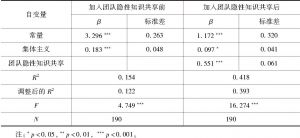论文
个人主义/集体主义对团队创造力的影响:隐性知识共享的中介作用
摘要
高校科研团队是生产知识的主力,青年群体已成为高校科研人员的主体部分。针对青年团队创造力影响因素的研究,有利于探寻如何激发团队整体的活力以及促进成员个体的发展。本研究以知识共享理论为基础,从个人层面考察个人主义/集体主义对团队创造力的作用机制。研究结果表明:(1)集体主义、个人主义均与团队创造力正相关,但集体主义与团队创造力的相关更高;(2)隐性知识共享与集体主义、团队创造力显著正相关,与个人主义显著负相关;(3)隐性知识共享部分中介了集体主义与团队创造力的关系。本研究对提高团队创造力、促进团队合作具有理论借鉴意义。
检索正文关键字
论文目录
- 一 问题提出
-
二 研究方法
- (一)研究对象
- (二)研究工具
- (三)效度分析
-
三 结果与分析
- (一)团队层面数据的聚合检验
- (二)描述性统计与相关性分析
- (三)回归分析
- (四)中介效应检验
-
四 讨论
- (一)个人主义/集体主义与隐性知识共享、团队创造力的关系
- (二)团队隐性知识共享与团队创造力的关系
- (三)集体主义与团队创造力:隐性知识共享的中介作用检验
查看更多>>>





